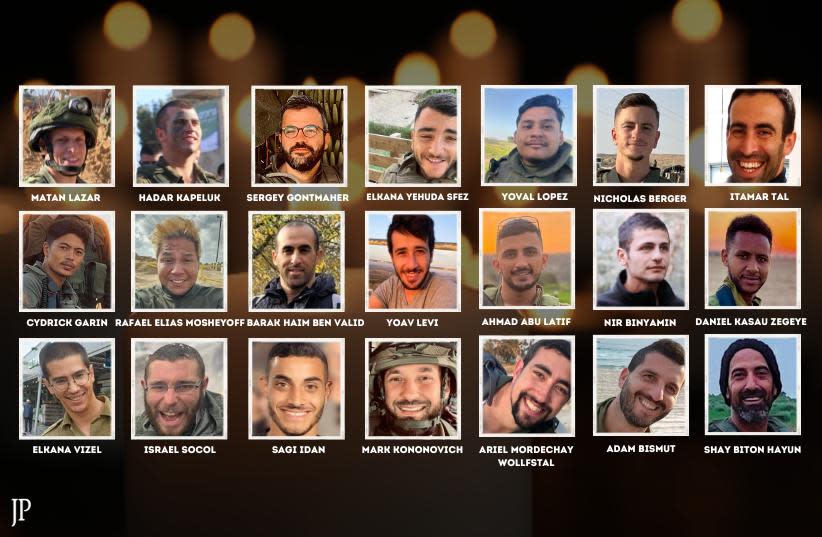The sadness is overwhelming.
In two horrific explosions in the central Gaza Strip on Monday, just meters away from Israel’s border, 21 lives were extinguished. Twenty-one fathers, sons, husbands, and brothers were killed in an instant. Twenty-one dreams were snuffed out. Twenty-one families were left devastated.
In addition to the 21 reservists who fell in this soul-crushing incident near Kissufim, another three soldiers were killed by an attack in a separate incident in Gaza, rendering Monday Israel’s deadliest day since the current war began with Hamas’ orgy of murder, rape, kidnapping, and mayhem on October 7.
One might have expected that a tragedy of this magnitude, a disaster of this scope, would have led to a chorus of voices inside Israel saying, “Enough is enough; it is time to end the war and bring the soldiers home.”
But that chorus did not emerge, at least not significantly, and that is telling. To the contrary, the dominant message heard Monday was the need to continue forward, despite the mind-numbing loss.

This spirit was summed up in a poignant letter that one of the fallen soldiers, Elkana Vizel, a 35-year-old father of four from Bnei Dekalim, left behind to be opened after his death. “Our overwhelming victory is more important than anything, so please just continue to work with all your might so that our victory is as overwhelming as possible,” he wrote.
Victory is more important than anything else
That message – keep fighting, despite the cost – is one heard often at the funerals of fallen soldiers as well as in conversations with soldiers and reservists who have fought in in Gaza. The message is simple: “Yes, this is difficult; yes, this is painful, but continue fighting until Hamas is defeated, until the hostages are released, and until Israelis can return to their homes.”
Tuesday’s reactions to Monday’s disaster showed that almost 16 weeks into a war that Israel neither expected, wanted, nor triggered, the country has not lost sight of what it is all about.
While in various parts of the world, even well-intentioned people may have lost the thread, that has not happened here.
And what is that thread? Simply put, Israel is fighting because its people were murdered, mutilated, and raped; Israel is fighting to get back those hostages taken by a maniacal terrorist regime; Israel is fighting to ensure that Hamas can never do this again; and Israel is fighting to send a message to others who may seek to emulate Hamas that it would not be in their interests to do so.
This war with Hamas is a just war of no choice, among the most just this nation has ever fought. This explains the widespread support to continue it, despite the exorbitantly high price and the pain and sorrow felt by millions of Israelis on Tuesday.
Israel, over the years, has been lauded for its resilience, and justifiably so. And what is resilience if not the ability to absorb blows and not let them throw you off course?
Strength is the capacity to deliver blows, with Israel demonstrating its strength daily in Gaza as well as on its other fronts, while resilience is the capacity to absorb them. Although Monday’s tragedy saddens Israelis deeply, it must not demoralize the country or shake its belief in this just war; it must not dent Israel’s resilience.
At the outset of this war, Israel’s leaders, both political and military, said that it would be a prolonged campaign, that it would take patience, and that there would be peaks and valleys.
Monday’s tragedy represents a valley – a deep valley. But there have been many peaks as well – first and foremost, the steady, methodical dismantling of Hamas’s infrastructure – and surely there will be more such achievements ahead.
What is important now is to find the cause of Monday’s disaster, implement the lessons learned, and mourn the losses while not allowing the pain to prevent Israel from pursuing a goal that is necessary if it hopes to survive and thrive in this region: thoroughly dismantling Hamas’s capabilities in a manner clear to friend and foe alike.
Those who tragically fell on Monday died in pursuit of that just aim.
